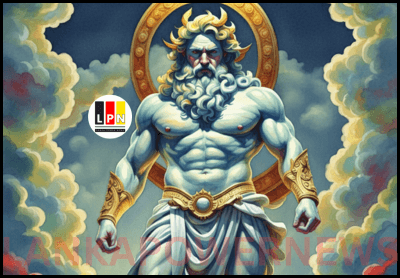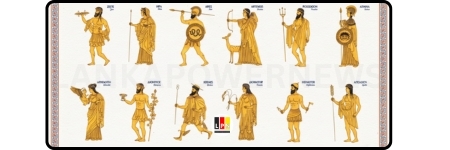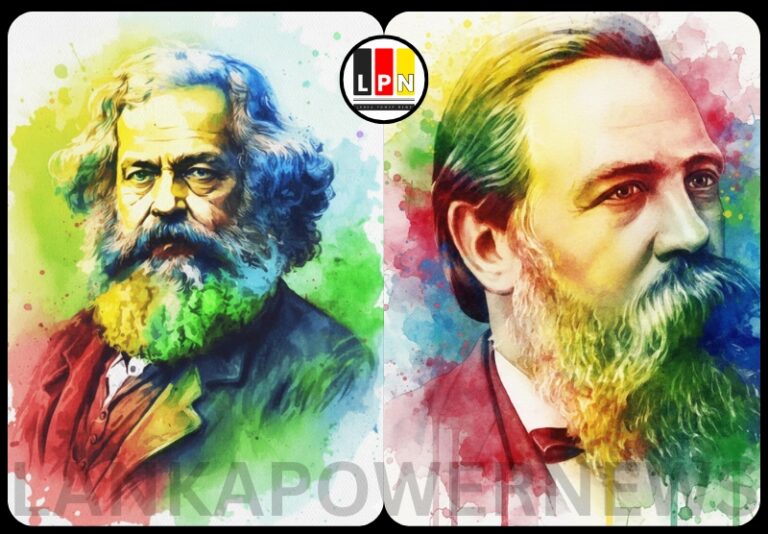The Greek Mythology…!
The Beginning / The Golden Age
Mythology is a common factor of many Ancient Civilisations’ cultures, Greek Mythology being one of the most famous. Passed on through generations, twisted by time and other colonies, many versions exist of these stories, which is why the ones recorded here might not match what you’ve been told before. Mythology is used by a community to explain the unexplainable, such as how the universe came to be.
In Ancient Greek religion, it was believed that before the universe, a kind of primordial void existed called Chaos. From Chaos, deities such as Gaia, Eros and Tartarus were created – Gaia, Earth itself, Eros, the force of love and attraction, and Tartarus, the underworld abyss. Gaia, feeling lonely, created Uranus, the sky. The two procreated, giving life to three important mythological groups: the Cyclops, the Hecatoncheires, and the Titans.
The three Cyclops sons were beings with only one eye and craftsman skills, the three Hecatoncheires had fifty heads and a hundred arms each, and the twelve Titans were somewhat normal deities. Uranus decided that the Hecatonchires were too ugly (or powerful, in some renditions) and cast them into Tartarus. Gaia, angered by this action against her children, encouraged one of her Titan kids to usurp Uranus’ throne. Cronus (spelling varies) the youngest Titan agreed, using a sickle to castrate his father. Uranus retreated to the sky permanently, and Cronus took his place as the King of the Universe, Titan of Time.
Fall of Cronus, Rise of Zeus

What was known as The Golden Age in Greek Mythology came to an inevitable end after Cronus received an ominous prophecy that he would be overthrown by one of his own children. Out of paranoia, every time his wife Rhea gave birth to one of their children, he swallowed the baby whole. Cronus swallowed five children before Rhea became desperate to save her babies, devising a plan of her own: she swapped the last child, Zeus, for a rock. Thus Zeus was raised on a hidden island far from his Father, growing up with the objective of rescuing his siblings. Once Zeus had grown into an adult, he travelled back to his father’s palace, posing as a cup bearer.
He brewed a special concoction that forced Cronus to vomit out the contents of his stomach – and since the children were gods, they somehow survived in Cronus’ stomach and had grown into adults themselves. A great decade-long war was waged between the Titans and the Gods called the Titanomachy for the control of the universe, led by Zeus. He also freed the Hecatonchires and Cyclops from Tartarus after Cronus had once again imprisoned them, like his own Father. They in turn allied with the Gods during the Titanomachy in gratitude. Eventually, the Gods prevailed, overthrowing Cronus. Zeus cut his Father up into pieces and threw them into Tartarus to ensure he would never reclaim his throne.
Zeus was named King of the Gods and the Sky, taking his sister Hera as his wife and settling on Mount Olympus, where later the main twelve Greek Gods would reside for the rest of time.
The Pantheon / The Twelve Olympians

The Greek Pantheon is made up of twelve major gods, worshipped for their respective fields of power. Six were born to Cronus and Rhea: Hades (God/King of the Underworld), Poseidon (God of the Sea), Hera (Goddess of Marriage/Fertility), Zeus, and Demeter (Goddess of Agriculture). The other six were born later, as second-generation Gods: Athena (Goddess of Wisdom, daughter of Zeus), Apollo (God of the Sun, Prophecy, Healing and more, son of Zeus), Artemis (Goddess of the Moon, Hunting, daughter of Zeus), Dionysus (God of Wine, Festivities, son of Zeus),
Aphrodite (Goddess of Love, Beauty, Fornication, technically created from Cronus), Hephaestus (God of the Smith, son of Hera), and Ares (God of War, son of Zeus). Despite the fact Zeus was married to Hera, he was frequently unfaithful, and the majority of his children were products of adultery. Of course, nothing could be done about this, as he was King and he could do as he wished. Most creatures, heroes or figures featured in myths were children of either Zeus or Poseidon, such as horses and the hero Heracles.
These twelve gods, often called The Twelve Olympians in reference to their legendary residence on Mount Olympus, can be found at the heart of Greek Mythology itself, an introduction into understanding their stories.







